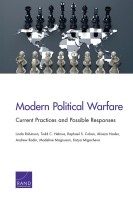 Liberal democracies like the United States and its allies needs to improve the ways they combat adversaries that use political warfare, according to a new RAND report that discusses how its practiced by state and nonstate actors – including Russia, Iran, and the Islamic State – and offers recommendations for how to combat it.
Liberal democracies like the United States and its allies needs to improve the ways they combat adversaries that use political warfare, according to a new RAND report that discusses how its practiced by state and nonstate actors – including Russia, Iran, and the Islamic State – and offers recommendations for how to combat it.
The study, Modern Political Warfare: Current Practices and Possible Responses, outlines the limits of this form of warfare; that is, it is not effective in all environments, particularly where the adversary lacks credibility or leverage with key audiences and where a society is politically, economically, and socially resilient. It provides a list of key attributes of political warfare practices, in summary form, as follows:
- Nonstate actors can conduct political warfare with unprecedented reach.
- Political warfare employs all the elements of national power.
- Political warfare relies heavily on unattributed forces and means.
- The information arena is an increasingly important battleground, where perceptions of success can be determinative.
- Detecting early-stage political warfare requires a heavy investment of intelligence resources.
- Political warfare can generate unintended consequences. • Economic leverage is increasingly the preferred tool of the strong.
- Political warfare often exploits shared ethnic or religious bonds or other internal seams.
- Political warfare extends, rather than replaces, traditional conflict and can achieve effects at lower cost.
“Information warfare works in various ways by amplifying, obfuscating, and, at times, persuading,” the study states. “Compelling evidence supplied in a timely manner is the best antidote to disinformation.” RTWT







